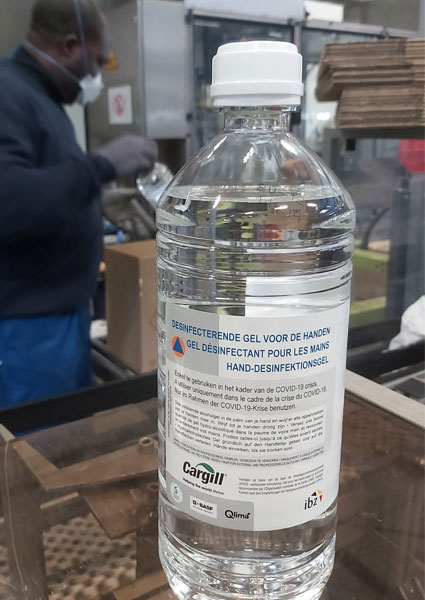Cargill donates disinfecting alcohol to the Belgian government
March 31, 2020, Mechelen, Belgium - Cargill, one of Europe's largest alcohol producers has donated 100,000 liters of disinfecting alcohol to the Belgian government to produce disinfectant hand gel for the emergency services.
 The donation contributes to the Civil Defense initiative, which takes care of the coordination of production and distribution. In the short term, this will solve the disinfecting gel shortage of the emergency services (fire brigade, police, emergency centers and the Civil Protection itself). Subsequently, 15,000 liters per day can be supplied. The disinfecting alcohol is produced at the Cargill site in Sas van Gent in the Netherlands.
The donation contributes to the Civil Defense initiative, which takes care of the coordination of production and distribution. In the short term, this will solve the disinfecting gel shortage of the emergency services (fire brigade, police, emergency centers and the Civil Protection itself). Subsequently, 15,000 liters per day can be supplied. The disinfecting alcohol is produced at the Cargill site in Sas van Gent in the Netherlands.
Since the rapid worldwide spread of the COVID-19 virus, the demand for disinfecting alcohol to sanitize surfaces has increased sharply, and many health institutions across Europe are facing imminent shortages. Last week, Cargill put its alcohol production in Europe at the service of this crisis and made a donation of 60,000 liters to the Dutch government and today comes the donation of 100,000 liters of alcohol plus 2,200 liters of glycerol in Belgium.
The crucial role of the food industry
In addition to alcohol for the beverage and health industry, Cargill also supplies a wide range of food ingredients. Cis Van Doninck, CFO of Cargill's Global Food Business: “Cargill delivers an essential service to the world – providing the ingredients, feed and food that nourish people and animals. We are working around the clock with farmers and our customers to feed the world safely and responsibly during this unprecedented time. Our eight Belgian plants are operating at full speed, and we are so grateful that every day our employees continue to produce the food people and animals need during this pandemic.”
In addition to the donation of alcohol, Cargill donated 228 protective Tyvek suits to the city of Vilvoorde, 600 protective jackets to the fire service of Walloon Picardy and 50 P3 masks to the Ghent University Hospital.
Cargill is a global company: thanks to the solidarity between sites, all production sites remain supplied with the necessary protective clothing and hygiene products.
These are just some examples of how Cargill is working with our non-profit and NGO partners around the globe to help address food shortages and emergency medical needs. Cargill has contributed nearly $4 million to support the communities in which our employees live and work. In addition to monetary donations, we are collaborating with non-profits around the globe to donate food, ingredients and other products to urgently address the needs of local communities. Cargill’s global and regional COVID-19 response is aligned with our purpose to nourish the world in a safe, responsible and sustainable way.
Media Contact: [email protected]
Cargill in Belgium
Cargill was established in Belgium via a grain importing office in Antwerp in 1953. We now have over 1,300 employees in eight locations: Antwerp (three locations), Izegem, Ghent, Herent, Vilvoorde, Mechelen and Mouscron. Cargill’s activities in Belgium include the production of food ingredients and the processing, distribution and trading of a variety of grains and oilseeds. Both Cargill’s European headquarters for its food businesses and Cargill’s European R&D Centre, are located in Belgium.
About Cargill
Cargill is committed to providing food, ingredients, agricultural solutions, and industrial products to nourish the world in a safe, responsible, and sustainable way. Sitting at the heart of the supply chain, we partner with farmers and customers to source, make and deliver products that are vital for living.
Our 160,000 team members innovate with purpose, providing customers with life’s essentials so businesses can grow, communities prosper, and consumers live well. With 159 years of experience as a family company, we look ahead while remaining true to our values. We put people first. We reach higher. We do the right thing—today and for generations to come. For more information, visit Cargill.com and our News Center.
